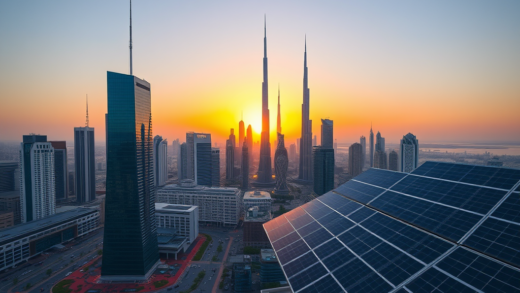Dubai stands on the brink of revolutionizing its logistics sector through the integration of artificial intelligence (AI) technologies. This transformation is driven by the need for enhanced operational efficiency, cost reduction, and sustainability in an increasingly competitive global market. AI-powered logistics not only streamline operations but also provide valuable insights for decision-making, significantly improving the overall supply chain. This article delves into the current landscape of AI in logistics in Dubai and explores its profound potential to redefine the future of the industry in the region.
Current Landscape of Logistics in Dubai

Dubai has long been recognized as a vital logistics hub in the Middle East due to its strategic geographic location and world-class infrastructure. The emirate boasts advanced transport networks, including air, sea, and land connectivity, enabling some of the most efficient logistics operations globally. However, as the industry continues to grow, logistical challenges arise, from congestion to rising operational costs. These challenges necessitate a shift towards smarter solutions, which is where AI technologies come into play. The integration of AI can enhance various logistics functions such as inventory management, shipment tracking, and route optimization, ultimately leading to more streamlined processes.
Key AI Technologies Transforming Logistics

The following key AI technologies are playing a significant role in transforming Dubai’s logistics landscape:
- Machine Learning: Machine learning algorithms analyze vast amounts of data to predict demand patterns, optimize inventory levels, and enhance forecasting accuracy.
- Robotic Process Automation (RPA): RPA automates repetitive tasks such as order processing and documentation, allowing human resources to focus on more strategic initiatives.
- Autonomous Vehicles: The use of drones and self-driving delivery vehicles can significantly reduce delivery times and enhance operational efficiency, particularly in urban areas.
- Internet of Things (IoT): IoT devices facilitate real-time tracking of shipments, allowing companies to monitor conditions and locations throughout the shipping process.
- Predictive Analytics: This technology leverages historical data to forecast future trends and assist in proactive decision-making, reducing risks and enhancing service levels.
Benefits of AI in Dubai’s Logistics Sector
The implementation of AI technologies in Dubai’s logistics sector presents various compelling benefits. First and foremost, businesses can experience considerable cost savings through process automation and reduced inefficiencies in logistics operations. Additionally, AI enhances accuracy in demand forecasting, leading to improved inventory management practices. The ability to predict maintenance needs through AI also minimizes downtime and keep operations running smoothly. Furthermore, enhanced tracking capabilities ensure that goods are monitored in real-time, which improves customer service and satisfaction. Not to mention, AI-driven insights can foster innovation and a culture of continuous improvement as companies adapt to changing market conditions.
Despite the vast potential, the transition to AI-powered logistics in Dubai is not without its challenges. One significant barrier is the high initial investment required for advanced technologies and training personnel. Additionally, there is a pressing need for robust data-sharing frameworks to facilitate the smooth flow of information across stakeholders in the logistics chain. There’s also the challenge of cybersecurity, as increased digitalization puts sensitive data at risk from potential breaches. Moreover, regulatory frameworks may need to evolve to keep pace with rapid technological advancements. The workforce must also adapt to these changes, and reskilling will be essential to ensure employees can work effectively alongside AI technologies.
Итог
Dubai’s commitment to embracing AI-powered logistics technologies has the potential to reshape the industry, driving efficiency and sustainability in unprecedented ways. With strategic investments and stakeholder collaboration, the logistic sector can mitigate the challenges faced and harness the benefits of AI. As developments continue to progress, the logistics landscape in Dubai promises to evolve, solidifying its status as a global leader in intelligent logistics infrastructure.
Часто задаваемые вопросы
1. What is AI in logistics?
AI in logistics refers to the use of artificial intelligence technologies to enhance various logistics functions, such as enhancing operational efficiency, predictive analytics, and automating routine tasks.
2. Why is Dubai focusing on AI in logistics?
Dubai aims to establish itself as a global logistics hub, and integrating AI helps improve efficiency, reduce costs, and meet the growing demand in the logistics sector while also addressing current challenges.
3. What are the main challenges of implementing AI in logistics?
Key challenges include high initial investment costs, the need for robust data-sharing frameworks, cybersecurity risks, and the necessity for workforce reskilling.
4. How does AI enhance customer service in logistics?
AI enhances customer service by facilitating real-time tracking of shipments, allowing businesses to respond proactively to customer inquiries and improve delivery times.
5. What technologies are contributing to AI-powered logistics?
Machine learning, robotic process automation, autonomous vehicles, the Internet of Things (IoT), and predictive analytics are some of the primary technologies driving AI in logistics.


